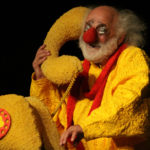
Thousands of Yiddish song lyrics, stored for decades in sealed boxes in the basement of the Ukrainian National Library, have given us the rare opportunity to look into the world of Yiddish-speaking Soviet Jewry during the Holocaust era.
Some 2.7 million Soviet Jews died during the Holocaust years, but until the boxes were discovered in the 1990s, the only information about Soviet Jews in the Holocaust came from the perpetrators rather than Jews, said Anna Shternshis, the Al and Malka Green associate professor in Yiddish studies at the University of Toronto.
Although the boxes were labelled, few people had paid attention to their contents until 2005, when Shternshis, on a grant, dove into them and retrieved a treasure-trove of handwritten and typed Yiddish documents, including song lyrics, stories and letters from Jewish Red Army soldiers.
The documents were collected in Ukraine from 1943 to 1947 by several ethnomusicologists, including Moisei Beregovsky, then head of the Cabinet for Jewish Musical Folklore of the Institute of Jewish Proletarian Culture in Kiev.
“LIKE A TIME CAPSULE FROM 1945”
Shternshis said it would have been dangerous for Holocaust survivors and Jewish Red Army soldiers to talk about, or for even for scholars to ask them about their wartime experiences. Paranoid, Stalin considered anyone who survived the war under German occupation a traitor, especially if they were Jewish.
“They would say, ‘How could you survive if you’re a Jew? You must have collaborated with the Germans. Songs were OK because there was no way to know where the song was written and who was singing it.”
In 1949, Beregovsky and his team were arrested and accused of being Jewish nationalists. With the creation of Israel, policies toward Jews changed and the Soviet government had adopted a policy of state anti-Semitism. The Yiddish archive was seized as proof of their nationalist activity.
The songs Shternshis found in the archive are “like a time capsule from 1945,” she said. Some are funny. Others are about fighting Hitler and getting revenge. The “guilt” songs document the experiences of soldiers who returned home to find their entire families dead. A Jew enlisted in the Red Army was more likely to survive the war than a Jewish civilian, she said.
Women also have a voice in the collection, with songs about waiting for their husbands and children to return from the war. “They tell them, ‘You go and fight the Germans and I will make you a burial shroud for Hitler,’” Shternshis said.
In 2014, Shternshis worked with Psoy Korolenko, a poet, philologist and performer of Yiddish music who matched the song lyrics with tunes from Soviet musicals of the 1940s and ‘50s. Some of the songs – currently being recorded will receive their world premiere in Richmond Hill, on Jan. 27.
The performers include Korolenko and Trio Loyko, accordionist Alexander Sevastian, trumpeter David Buchbinder, clarinetist/conductor Shalom Bard and vocalists Isac Rosenberg and Toronto jazz singer Sophie Milman, one of Shternshis’ former students.
Born in Russia, Milman immigrated to Israel and then to Canada with her family. Her two grandfathers, both from Ukraine, came home after the war, to find their families – parents, siblings, nieces, nephews – had perished, she said. “I feel like the world is aware of what happened in concentration camps, but not of what Soviet Jews endured and overcame.”
About the songs, Milman said, “There’s something very special about the efforts of these impressionable, mostly young people – unlucky enough to be caught in one of the ugliest chapters of human history – to express themselves through song.”
Yiddish Glory: The Lost Songs of Life and Fate, performed at the Richmond Hill Centre for the Performing Arts on Jan. 27, 2016
by Ruth Schweitzer
Source: cjnews.com



